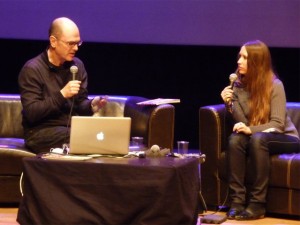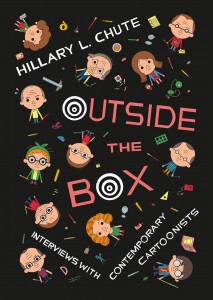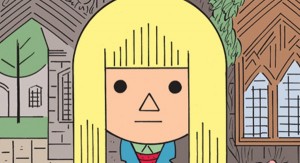For those of us who care about the “single vision” (Hillary Chute) of the comics creator who both draws and writes his/her comic, a related problem arises: shall we rely exclusively on the work itself to make meaning, or supplement (augment, complicate, tease out) this meaning by listening to the author’s comments on process, on intention, on effect? It’s an old question in literary criticism, and, of course, the answer is influenced by many things, including a) the availability of direct commentary from authors (interviews, journals, essays, forewords, etc.), b) prevailing approaches to texts in a given region, era, school of thought (contrast, most obviously, the penchant for psychoanalytic criticism at the beginning and end of the 20th century against the fetishization of the text alone by New Critics in the mid-20th century), and c) individual reader inclinations to treat works of art as ends in themselves (products) vs. a view of artistic creation that sees any particular text as a small manifestation and minor component of a larger artistic, or thought, project (process). Lately, I’ve been reading works of natural science more than those from humanities disciplines, and I think an apt biological analogy for what I’m describing would be the genotype/phenotype distinction.
If one examines the work of art (a given comic) as a unique entity deserving of close scrutiny, a world in itself, it might be argued that one is engaging in phenotypic study (i.e. exploration of the particular expression of an artistic gene, one of a kind as we humans are [purportedly] each one of a kind). Phenotypical study of single-creator comics also naturally allows for text-to-text comparison (inside a creator’s oeuvre as well as against works by others) but would eschew contextualizing the particular work of art in the self-espoused larger project of the work’s creator. A genotypical approach, in contrast, would expand out from the given work (which is, by its very nature, a limited, flawed, and partial expression of an author’s vision) to ask larger questions of the author: what is your artistic project? What is your process? In what ways does your work of art reflect or distort the concepts you are driven to illuminate by creating comics? No fear of intentional fallacy along this view; it becomes not only acceptable, but also necessary to query the author about the imagined ideal.
If you value the latter, you’ll find Hillary Chute’s latest publication, Outside the Box: Interviews with Contemporary Cartoonists (Chicago UP, 2014) essential reading. Chute is one of our premier comics scholars, combining a fine eye for formal comics criticism with a deep commitment to showcasing the human beings who create those very comics. This respect for creator and form has earned her an unusually trusted position in the art-comic community, softening the divide between academia and fandom. Leveraging this trust, Chute has gained direct access to some of our best: Chris Ware, Joe Sacco, Art Spiegelman, Alison Bechdel, Lynda Barry and others. These artists allow her to ask layered, intimate questions about their lives and their work; they allow her to broadcast and to print their responses. Outside the Box not only makes available these rare conversations, it also features excellent production values and graphics: the book is filled with full-color and sharply rendered black-and-white exemplar panels from each of her subjects. Even the paper and font is lush; it’s a really beautiful book. More importantly, however, it gives Chute a place to gather the thoughts of contemporary comics creators contiguously so that we can see more clearly that there is a synthetic thread aligning their projects, despite stark differences in their work; as Chute notes, “What is so riveting about the group of artists included in Outside the Box is how imbricated they are with each other–and yet how radically different all their work looks from each other’s.” (3) Chute clearly cares about genotypic concerns, with meta-reflection on the evolving form of comics as her primary aim: “The exhilarating feature of my interviews with cartoonists—for me, and hopefully for others—is that they capture moments of practitioners reflecting on the form as it is being shaped [emphasis hers] in contemporary culture.” (2)
Here are, for me, some of the highlights of those conversations, in light of the question I raised earlier in this post (is it valuable to listen to what comics creators say about their process and their products? Judge for yourself):
Françoise Mouly: “And because comics are a window into the thinking process of the artist, a revealing ‘automatic drawing’ as well as a distillation in concise terms of the author’s story, the object of the printed book integrates many crucial aspects.” (187)
Joe Sacco: “I think I understand how history works. I understand why one people are battling another people. I understand that they both want land. But ultimately there’s a level that I haven’t really got to yet. I’m touching on motive in places, like what makes someone pull a trigger? What makes one person beat another one to death? I know we can dehumanize people…. But I think I need to go in another direction after this book. What am I going to do after this? Keep detailing massacres? For me, personally, I think I’m not going to get anything out of it anymore. I’ve come to the end of that.”
Hillary Chute: “You mean in the arc of your career?”
Joe Sacco: “In the arc of my understanding of why people do things and how things develop the way they do. It’s not that there aren’t other incidents I could detail and make a great book about—an interesting book. It’s just that for me, personally, it won’t lead me anywhere new, and it’s kind of about me on some level. If you’re a creative person, it has to be, I think.” (143-4)
Daniel Clowes: “[Wilson]’s certainly got my history to some degree. I’d sort of like to keep that as vague as possible, because some of what he’s about is exactly me and some of it is the opposite of me. I mean, everything is made up for the most part. There’s a grain of truth to it all, and everything is made up. That’s why I never wanted to do autobiography, because it’s so much easier to make things up.” (113)
Daniel Clowes: “I certainly know when I sit down to re-read all my comics, I’m overwhelmed by how much more personal they are than I ever thought they were.” (114)
Alison Bechdel: “To go back to your touch question, I feel like the book is in a way me, my self, my body. And I’m asking the reader to hold me not just figuratively, in the sense of an analytic ‘holding environment,’ but literally. “Hold me!” It is so pathetic! What was I thinking?”
Hillary Chute: I really love this response. You and I are teaching a course together on autobiography, and one of the books we’re teaching is Roland Barthes by Roland Barthes. He discusses his idea that ‘one writes in order to be loved’—and then he says this idea is endurable only if you first find it touching, then imbecilic. Then you are finally free to find it accurate. But I love the idea of writing in order to be held.” (174)



